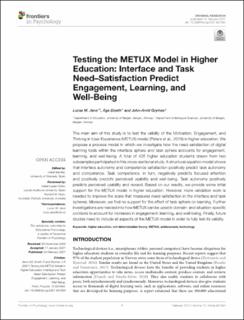Testing the METUX Model in Higher Education: Interface and Task Need–Satisfaction Predict Engagement, Learning, and Well-Being
Journal article, Peer reviewed
Published version

Åpne
Permanent lenke
https://hdl.handle.net/11250/2764430Utgivelsesdato
2021-02-24Metadata
Vis full innførselSamlinger
- Department of Education [296]
- Registrations from Cristin [9487]
Sammendrag
The main aim of this study is to test the validity of the Motivation, Engagement, and Thriving in User Experience (METUX) model (Peters et al., 2018) in higher education. We propose a process model in which we investigate how the need-satisfaction of digital learning tools within the interface sphere and task sphere accounts for engagement, learning, and well-being. A total of 426 higher education students drawn from two subsamples participated in this cross-sectional study. A structural equation model shows that interface autonomy and competence satisfaction positively predict task autonomy and competence. Task competence, in turn, negatively predicts focused attention and positively predicts perceived usability and well-being. Task autonomy positively predicts perceived usability and reward. Based on our results, we provide some initial support for the METUX model in higher education. However, more validation work is needed to improve the scale that measures need-satisfaction in the interface and task spheres. Moreover, we find no support for the effect of task sphere on learning. Further investigations are needed into how METUX can be used in domain- and situation-specific contexts to account for increases in engagement, learning, and well-being. Finally, future studies need to include all aspects of the METUX model in order to fully test its validity.
